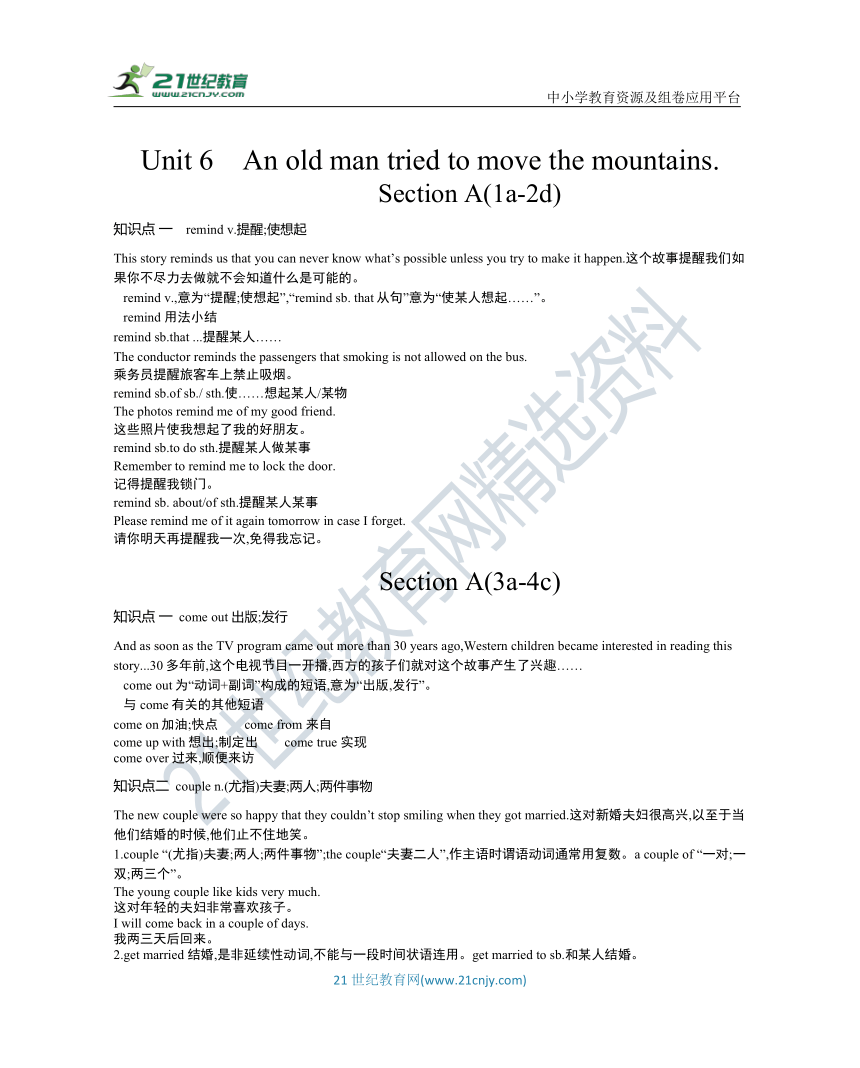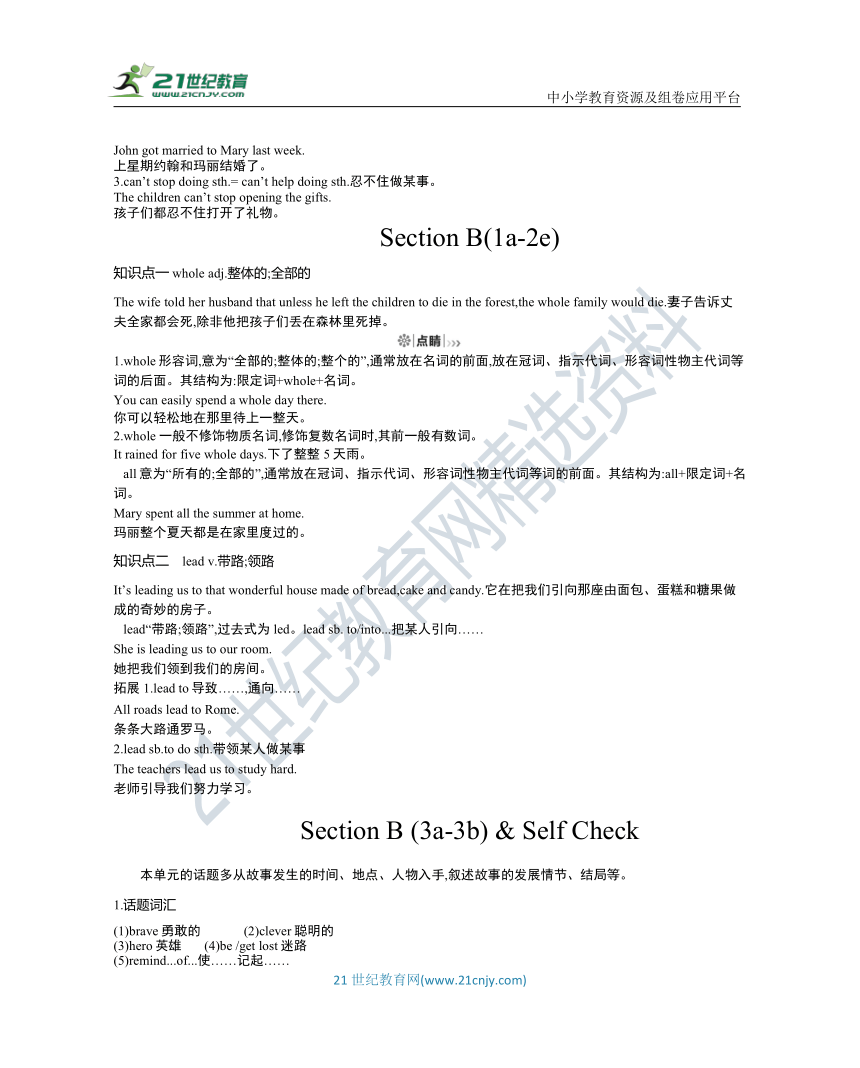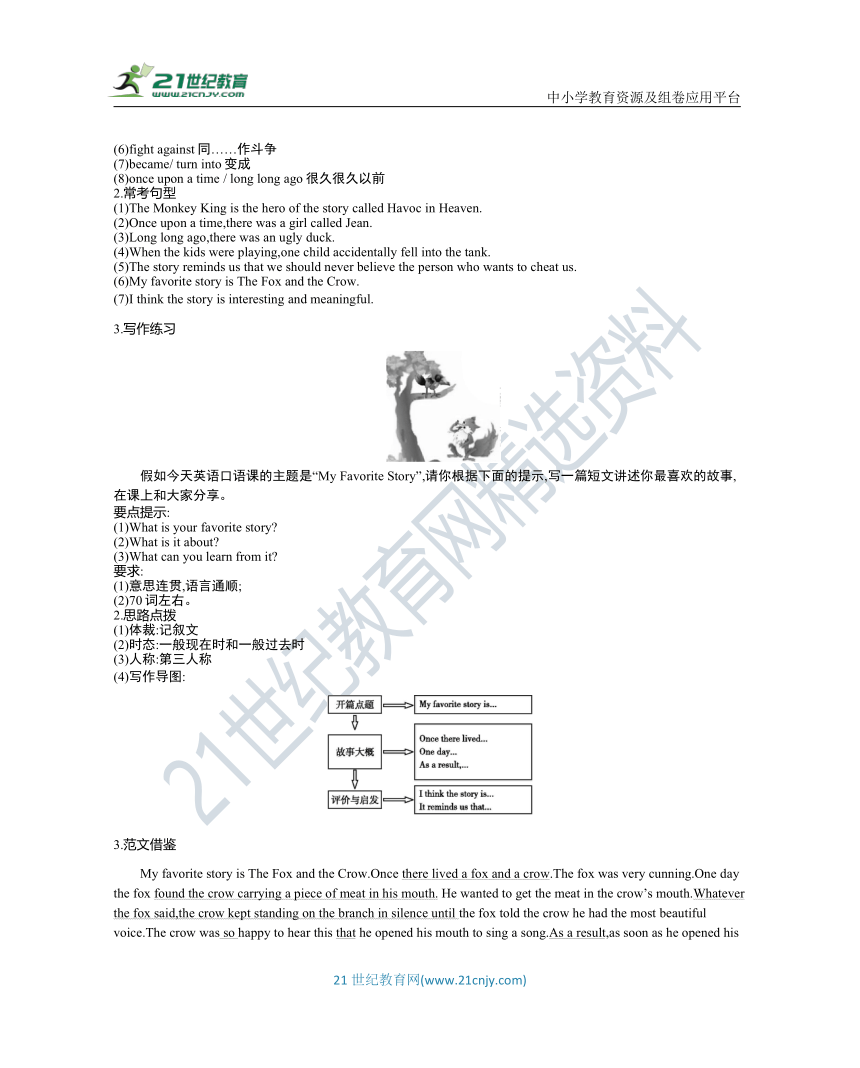Unit 6 An old man tried to move the mountains. 要点讲解
文档属性
| 名称 | Unit 6 An old man tried to move the mountains. 要点讲解 |  | |
| 格式 | zip | ||
| 文件大小 | 1.3MB | ||
| 资源类型 | 试卷 | ||
| 版本资源 | 人教新目标(Go for it)版 | ||
| 科目 | 英语 | ||
| 更新时间 | 2019-05-14 07:18:20 | ||
图片预览



文档简介
中小学教育资源及组卷应用平台
Unit 6 An old man tried to move the mountains.
Section A(1a-2d)
知识点 一 remind v.提醒;使想起
This story reminds us that you can never know what’s possible unless you try to make it happen.这个故事提醒我们如果你不尽力去做就不会知道什么是可能的。
remind v.,意为“提醒;使想起”,“remind sb. that从句”意为“使某人想起……”。
remind 用法小结
remind sb.that ...提醒某人……
The conductor reminds the passengers that smoking is not allowed on the bus.
乘务员提醒旅客车上禁止吸烟。
remind sb.of sb./ sth.使……想起某人/某物
The photos remind me of my good friend.
这些照片使我想起了我的好朋友。
remind sb.to do sth.提醒某人做某事
Remember to remind me to lock the door.
记得提醒我锁门。
remind sb. about/of sth.提醒某人某事
Please remind me of it again tomorrow in case I forget.
请你明天再提醒我一次,免得我忘记。
Section A(3a-4c)
知识点 一 come out 出版;发行
And as soon as the TV program came out more than 30 years ago,Western children became interested in reading this story...30多年前,这个电视节目一开播,西方的孩子们就对这个故事产生了兴趣……
come out为“动词+副词”构成的短语,意为“出版,发行”。
与come有关的其他短语
come on加油;快点 come from 来自
come up with想出;制定出 come true 实现
come over过来,顺便来访
知识点二 couple n.(尤指)夫妻;两人;两件事物
The new couple were so happy that they couldn’t stop smiling when they got married.这对新婚夫妇很高兴,以至于当他们结婚的时候,他们止不住地笑。
1.couple “(尤指)夫妻;两人;两件事物”;the couple“夫妻二人”,作主语时谓语动词通常用复数。a couple of “一对;一双;两三个”。
The young couple like kids very much.
这对年轻的夫妇非常喜欢孩子。
I will come back in a couple of days.
我两三天后回来。
2.get married 结婚,是非延续性动词,不能与一段时间状语连用。get married to sb.和某人结婚。
John got married to Mary last week.
上星期约翰和玛丽结婚了。
3.can’t stop doing sth.= can’t help doing sth.忍不住做某事。
The children can’t stop opening the gifts.
孩子们都忍不住打开了礼物。
Section B(1a-2e)
知识点一 whole adj.整体的;全部的
The wife told her husband that unless he left the children to die in the forest,the whole family would die.妻子告诉丈夫全家都会死,除非他把孩子们丢在森林里死掉。
1.whole形容词,意为“全部的;整体的;整个的”,通常放在名词的前面,放在冠词、指示代词、形容词性物主代词等词的后面。其结构为:限定词+whole+名词。
You can easily spend a whole day there.
你可以轻松地在那里待上一整天。
2.whole 一般不修饰物质名词,修饰复数名词时,其前一般有数词。
It rained for five whole days.下了整整5天雨。
all意为“所有的;全部的”,通常放在冠词、指示代词、形容词性物主代词等词的前面。其结构为:all+限定词+名词。
Mary spent all the summer at home.
玛丽整个夏天都是在家里度过的。
知识点二 lead v.带路;领路
It’s leading us to that wonderful house made of bread,cake and candy.它在把我们引向那座由面包、蛋糕和糖果做成的奇妙的房子。
lead“带路;领路”,过去式为led。lead sb. to/into...把某人引向……
She is leading us to our room.
她把我们领到我们的房间。
拓展1.lead to导致……,通向……
All roads lead to Rome.
条条大路通罗马。
2.lead sb.to do sth.带领某人做某事
The teachers lead us to study hard.
老师引导我们努力学习。
Section B (3a-3b) & Self Check
本单元的话题多从故事发生的时间、地点、人物入手,叙述故事的发展情节、结局等。
1.话题词汇
(1)brave勇敢的 (2)clever聪明的
(3)hero英雄 (4)be /get lost迷路
(5)remind...of...使……记起……
(6)fight against同……作斗争
(7)became/ turn into变成
(8)once upon a time / long long ago很久很久以前
2.常考句型
(1)The Monkey King is the hero of the story called Havoc in Heaven.
(2)Once upon a time,there was a girl called Jean.
(3)Long long ago,there was an ugly duck.
(4)When the kids were playing,one child accidentally fell into the tank.
(5)The story reminds us that we should never believe the person who wants to cheat us.
(6)My favorite story is The Fox and the Crow.
(7)I think the story is interesting and meaningful.
3.写作练习
假如今天英语口语课的主题是“My Favorite Story”,请你根据下面的提示,写一篇短文讲述你最喜欢的故事,在课上和大家分享。
要点提示:
(1)What is your favorite story?
(2)What is it about?
(3)What can you learn from it?
要求:
(1)意思连贯,语言通顺;
(2)70词左右。
2.思路点拨
(1)体裁:记叙文
(2)时态:一般现在时和一般过去时
(3)人称:第三人称
(4)写作导图:
3.范文借鉴
My favorite story is The Fox and the Crow.Once there lived a fox and a crow.The fox was very cunning.One day the fox found the crow carrying a piece of meat in his mouth. He wanted to get the meat in the crow’s mouth.Whatever the fox said,the crow kept standing on the branch in silence until the fox told the crow he had the most beautiful voice.The crow was so happy to hear this that he opened his mouth to sing a song.As a result,as soon as he opened his mouth,the meat fell onto the ground and the fox got it.I think the story is interesting and meaningful.It reminds us that we should never believe the person who wants to cheat us.?
单元语法归纳与练习
状语从句
1.时间状语从句
时间状语从句常用when,as,while,before,after,since,not...until,as soon as,whenever等来引导。
As soon as he comes back,I’ll tell him the good news.他一回来我就告诉他这个好消息。
2.原因状语从句
原因状语从句通常由because,since,as等连词引导。
He didn’t come to school because he was ill.
他因为病了,所以没来上学。
3.结果状语从句
结果状语从句由so...that,such...that,so (that)引导。
He is so poor that he can’t buy a bike for his son.
他太穷了,不能为他的儿子买辆自行车。
My pencil fell under the desk,so (that) I couldn’t see it.
我的铅笔掉到课桌下面了,以至于我看不到它了。
4.条件状语从句
条件状语从句通常由if,unless引导。if引导的条件状语从句中,主句用一般将来时,从句用一般现在时,遵循“主将从现”的原则。
What shall we do if it snows tomorrow?
如果明天下雪我们将做什么?
Don’t leave the building unless I tell you to.
不要离开这座楼,除非我告诉你离开。
5.比较状语从句
常用as(so)...as,than引导。
Jim runs faster than Tom.吉姆比汤姆跑得快。
This river is almost as long as that river.
这条河和那条河几乎一样长。
6.让步状语从句
让步状语从句通常由although,though等连词引导。
Although I am tired,I must go on working.
虽然我累,但我必须继续工作。
7.目的状语从句
由so (that),in order that等引导。
We started early so that we could catch the first train.我们很早就出发,以便我们能赶上第一班火车。
HYPERLINK "http://21世纪教育网(www.21cnjy.com)
" 21世纪教育网(www.21cnjy.com)
同课章节目录
- Unit 1 What's the matter?
- Section A
- Section B
- Unit 2 I'll help to clean up the city parks.
- Section A
- Section B
- Unit 3 Could you please clean your room?
- Section A
- Section B
- Unit 4 Why don't you talk to your parents?
- Section A
- Section B
- Unit 5 What were you doing when the rainstorm came
- Section A
- Section B
- Review of Units 1-5
- Unit 6 An old man tried to move the mountains.
- Section A
- Section B
- Unit 7 What's the highest mountain in the world?
- Section A
- Section B
- Unit 8 Have you read Treasure Island yet?
- Section A
- Section B
- Unit 9 Have you ever been to a museum?
- Section A
- Section B
- Unit 10 I've had this bike for three years.
- Section A
- Section B
